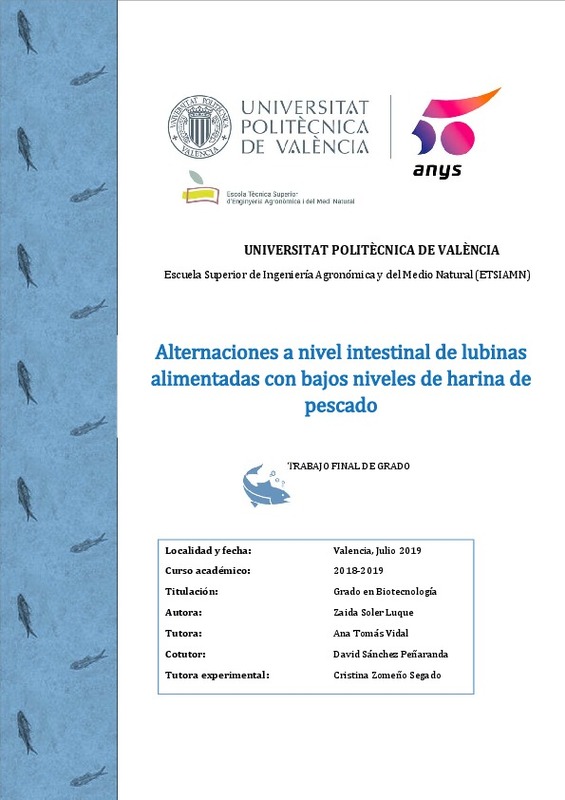JavaScript is disabled for your browser. Some features of this site may not work without it.
Buscar en RiuNet
Listar
Mi cuenta
Estadísticas
Ayuda RiuNet
Admin. UPV
Alternaciones a nivel intestinal de lubinas alimentadas con bajos niveles de harina de pescado
Mostrar el registro sencillo del ítem
Ficheros en el ítem
| dc.contributor.advisor | Tomás Vidal, Ana
|
es_ES |
| dc.contributor.advisor | Sánchez Peñaranda, David
|
es_ES |
| dc.contributor.advisor | Zomeño, Cristina
|
es_ES |
| dc.contributor.author | Soler Luque, Zaida
|
es_ES |
| dc.date.accessioned | 2019-09-02T12:45:00Z | |
| dc.date.available | 2019-09-02T12:45:00Z | |
| dc.date.created | 2019-07-19 | |
| dc.date.issued | 2019-09-02 | es_ES |
| dc.identifier.uri | http://hdl.handle.net/10251/124758 | |
| dc.description.abstract | [ES] La necesidad de una mayor producción de harina de pescado para satisfacer la actual demanda en el mercado, así como su elevado coste, ha puesto de manifiesto la necesidad de buscar fuentes proteicas alternativas más sostenibles y con mayor disponibilidad. Entre ellas, las fuentes vegetales como la soja o el gluten de trigo han demostrado ser una opción viable. En el presente estudio se abordó esta temática mediante la realización de un ensayo de sustitución a largo plazo (196 días) empleando ejemplares de lubina (Dicentrarchus labrax) y tres dietas experimentales (FM30, FM15 y FM0) con diferentes niveles de sustitución de harina de pescado por proteínas vegetales. Con este fin, se estudió el crecimiento y la supervivencia y se evaluó el efecto de la eliminación de la harina de pescado sobre la respuesta inmune e inflamatoria a nivel intestinal, por tratarse de un órgano sensible a la dieta ya que se encuentra en contacto directo con el alimento ingerido. En este último caso, se empleó la técnica de RT-qPCR para analizar la expresión relativa de los genes Casp9, TCR ß, IL-8, IL-10, TGF ß, TNF α, Muc2, Fth y ßact los cuales se encuentran involucrados a nivel estructural, inflamatorio e/o inmune. Los resultados mostraron un menor crecimiento y supervivencia del grupo con una sustitución total de la harina de pescado (FM0) asociados a una deficiencia nutricional y un estado inmunodeprimido. Los resultados del nivel de expresión de los genes Muc2 y ßact, sumado a la tendencia de TGF ß e IL-8, confirmaron el estado de inmunodepresión presente en las lubinas alimentadas con la dieta FM0 y una respuesta inflamatoria en el grupo FM15 con respecto al control FM30. | es_ES |
| dc.description.abstract | [EN] The increasing production of fish meal in order to satisfy the current demand as well as the high production cost has demonstrated the need of looking for more sustainable and available protein sources. Among them, plant sources such as soybean or gluten wheat seem to be a good option. The current study has followed this line of discussion by the development of a long-term substitution assay (196 days) using European sea bass (Dicentrarchus labrax) and three different experimental diets (FM30, FM15 and FM0) with variable levels of replacement of fish meal by vegetable proteins. To evaluate the effects of the diets, different procedures were used such as monitoring the growth performance and mortality of fish as well as assessment of the immune and inflammatory response, being the intestine the site of choice because of its sensitivity to diet due to it is in direct contact with the ingested meal. Regarding the last method, RT-qPCR technique was selected for analysing the relative gene expression of Casp9, TCR ß, IL-8, IL-10, TGF ß, TNF α, Muc2, Fth and ßact which are involved at structural, immune or inflammatory level. The results showed lower growth performance and survival in the FM0 group, the one with the highest level of fish meal replacement, which has been associated with a nutritional deficiency and an immunocompromised status. The expression profile of Muc2 and ßact, together with tendency of TGF ß e IL-8 reinforced this idea and manifest an immune response of the FM15 group in comparison with the control group FM30. | es_ES |
| dc.format.extent | 46 | es_ES |
| dc.language | Español | es_ES |
| dc.publisher | Universitat Politècnica de València | es_ES |
| dc.rights | Reserva de todos los derechos | es_ES |
| dc.subject | Acuicultura | es_ES |
| dc.subject | Lubina | es_ES |
| dc.subject | Crecimiento | es_ES |
| dc.subject | Harina de pescado | es_ES |
| dc.subject | Materias primas vegetales | es_ES |
| dc.subject | Expresión génica | es_ES |
| dc.subject | RT-qPCR | es_ES |
| dc.subject | Inflamación | es_ES |
| dc.subject | Aquiculture | es_ES |
| dc.subject | European sea bass | es_ES |
| dc.subject | Growth | es_ES |
| dc.subject | Fish meal | es_ES |
| dc.subject | Vegetable sources | es_ES |
| dc.subject | Gene expression | es_ES |
| dc.subject | Inflammation | es_ES |
| dc.subject.classification | PRODUCCION ANIMAL | es_ES |
| dc.subject.classification | BIOLOGIA ANIMAL | es_ES |
| dc.subject.other | Grado en Biotecnología-Grau en Biotecnologia | es_ES |
| dc.title | Alternaciones a nivel intestinal de lubinas alimentadas con bajos niveles de harina de pescado | es_ES |
| dc.type | Proyecto/Trabajo fin de carrera/grado | es_ES |
| dc.rights.accessRights | Abierto | es_ES |
| dc.contributor.affiliation | Universitat Politècnica de València. Departamento de Ciencia Animal - Departament de Ciència Animal | es_ES |
| dc.contributor.affiliation | Universitat Politècnica de València. Escuela Técnica Superior de Ingeniería Agronómica y del Medio Natural - Escola Tècnica Superior d'Enginyeria Agronòmica i del Medi Natural | es_ES |
| dc.description.bibliographicCitation | Soler Luque, Z. (2019). Alternaciones a nivel intestinal de lubinas alimentadas con bajos niveles de harina de pescado. http://hdl.handle.net/10251/124758 | es_ES |
| dc.description.accrualMethod | TFGM | es_ES |
| dc.relation.pasarela | TFGM\111366 | es_ES |
Este ítem aparece en la(s) siguiente(s) colección(ones)
-
ETSIAMN - Trabajos académicos [3541]
Escuela Técnica Superior de Ingeniería Agronómica y del Medio Natural






